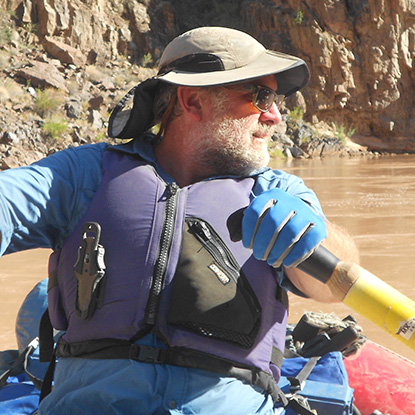Greg Gordon was born at the junction of Cherry Creek and the South Fork of the Platte river, a place also known as Denver, Colorado. He spent much of his adult life living along the Clark Fork and Dearborn rivers of Montana and now lives a short walk from the confluence of Latah Creek and the Spokane River. Rivers have obviously informed much of his identify, relationship to place and current research.
The genesis of his first book, Gringos in the Mist, was a canoe trip down the Yasuni River in Ecuador. His second book, Landscape of Desire, follows a group of college students on a three-week trip along the Dirty Devil River in Utah. And his current project is a book about urban rivers and rewilding.
Like the rivers he studies, Greg followed a rather circuitous route to his present position as Associate Professor of Environmental Studies. After completing his BA in English from the University of Colorado, Greg spent the next five years working as a seasonal park ranger in Utah, Alaska, and Washington. In 1989, he moved to Montana to attend graduate school and then spent the next 20 years leading field studies programs in Utah, Montana, Canada, Chile, and Costa Rica. During this time, he also traveled extensively throughout South America, Asia, and Africa. But his home base was a yurt in the backwoods of central Montana. In 2005, he returned to the University to earn a PhD in History and was fortunate enough to land a position at Gonzaga in 2011.
Selected Publications
“Boundaries: A Bioregional History of Place,” Charter: Gonzaga’s Journal of Scholarship and Opinion, vol. 54, 2016-17: 39-53
When Money Grew on Trees: A. B. Hammond and the age of the timber baron (University of Oklahoma Press, 2014)
Progress at a Price: A. B. Hammond, Montana’s Gilded Age Lumber Baron,” Big Sky Journal, (Summer 2012): 54-62
“Steamboats, Woodhawks and War on the Upper Missouri River” Montana: The Magazine of Western History, (Summer 2011 https://www.researchgate.net/publication/280043518_Steamboats_Woodhawks_and_War_on_the_Upper_Missouri_River
“Mountains and Rivers Without End: Teaching Field Courses In Western History,” (co-authored with David Brooks), Western Historical Quarterly 42 (Summer, 2011)
“Economic Phoenix: How A. B. Hammond used the depression of 1893 and a pair of defunct Oregon railroads to build a lumber empire,” Oregon Historical Quarterly (Winter 2009).
“Weaving Wildness: The Paradox of Teaching About Wilderness as Place,” in Teaching About Place, University of Nevada Press (2008)
“The Sustainability Revolution,” Making Other Arraignments, Orion (Nov. 2008)
The Landscape of Desire: Identity and Nature in Utah’s Canyon Country, Utah State University Press. (2003) http://digitalcommons.usu.edu/usupress_pubs/142/?utm_source=digitalcommons.usu.edu%2Fusupress_pubs%2F142&utm_medium=PDF&utm_campaign=PDFCoverPages
“Himalayan Harvest,” Transitions Abroad. (Sept/Oct 2000)
“Neighborhood Struggles,” Orion Afield. (v3 n2 p10-14 Spring 1999)
“Wilderness U,” Orion Afield. (Spring 1999)
Gringos in the Mist, A Naturalist’s Journey Through Ecuador, Laughing Coyote Press. (1995)
“Jungle Rot,” Outdoors Illustrated, (April 1994)
“MUD, Down Home Project,” E Magazine. (October 1991)

